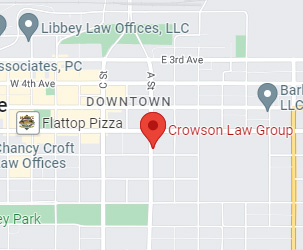Alaska Attorneys for Toxic Exposure
What Is Toxic Exposure?
Chemicals and other substances are classified as “toxic” when they interfere with the body’s normal functioning. Essentially, toxins either speed up or slow down normal physiological processes. They may increase heart rate, induce rapid sweating, decrease muscle response, or slow breathing rate.
Speak with Us About Your Need
"*" indicates required fields
In some cases, toxins slow down these functions to the point of stopping them entirely, as in cases of muscle paralysis or suffocation. Effects of toxic exposure range from minor headaches to severe injuries and death. The nature of the injuries depends on a variety of factors, including length of exposure, type of toxic substance, and method of contact (such as inhaling, touching, ingesting).
Ongoing scientific studies confirm that we are exposed to an alarming number of toxic substances on a daily basis. Some of these substances occur naturally, such as mold spores, which are sometimes referred to as mycotoxins. Others, like pesticides and heavy metals, are introduced by human intervention. You can read more about toxic exposure in an article in Scientific American, a story by Medical News Today, and a report by CNN.
How Do I Know if I’ve Had Toxic Exposure?
Toxic exposure injuries can have many causes, including:
- contamination of groundwater or soil due to dumping of wastes and chemicals
- contamination of air or environment due to release of noxious gases or toxins
- chemical exposure in the workplace
- exposure to mold spores
- exposure to outdated construction materials in the home or workplace, such as asbestos, lead paint, or lead plumbing
- toxins or dangerous chemicals in defective medications or drugs
If you’ve think you have experienced toxic exposure, Crowson Law Group is here to help you. Our personal injury lawyers will work on securing compensation for your medical bills and lost wages, while you concentrate on recovering. With offices in Anchorage and Wasilla, we proudly serve all of Alaska. We invite you to call or contact us online to schedule a free, confidential consultation to get your questions answered.
Toxic Exposure Risk
The risk of toxic exposure increases dramatically in certain occupations. Most toxic exposure cases occur in factories or locations where dangerous chemicals are used, manufactured, or mined. The manufacture of textiles, refined oil, office supplies, electronics, tobacco, and plastic has been known to release many dangerous chemicals into the workplace and surrounding environment.
Welders are regularly exposed to the chemical manganese through welding smoke, which can lead to manganism (manganese poisoning). Construction workers may be exposed to silica dust, arsenic preservatives, lead coatings, asbestos, formaldehyde, or other toxins during construction and demolition processes. Auto shops, beauty salons, dental offices, and hospitals also use noxious gases, chemicals, and other toxic substances. Even office workers can suffer from substances such as cleaning chemicals or paint if their workplaces are not ventilated properly.
Toxic Exposure Injuries and Symptoms
Toxic exposure injuries may result from skin contact, breathing fumes, or accidental ingestion. Toxins might affect a particular organ or bodily system, such as respiratory, gastrointestinal, reproductive, neurological, or dermatological systems. They also can have negative effects throughout the body.
Injuries range from lung cancer (mesothelioma) to lead poisoning and other diseases or illnesses. They are so varied that providing a short yet comprehensive list of symptoms is nearly impossible. Symptoms of toxic exposure may simply look like the common cold or flu. They can also be much more severe. If you know you are at increased risk of toxic exposure and experience any of the following symptoms, seek medical attention immediately:
- irritation of the nose and throat
- coughing, tight chest, or difficulty breathing
- abdominal pain and cramping
- nausea and vomiting
- diarrhea or constipation
- changes in urination frequency
- kidney damage
- rashes
- itching
- swelling
- back pain
- anemia
- low energy and fatigue
- headache
- dizziness
- confusion
- depression
- irritability
- aggressive behavior
- convulsions
- infertility or miscarriage
When to Talk with a Lawyer about Toxic Exposure
Once you’ve tended to the most important consideration — your health — you may benefit from talking with one of our toxic exposure attorneys. There are a number of reasons that seeking legal counsel is advisable, including:
- paying medical bills
- recouping lost wages from missing work
- preventing continued toxic exposure for yourself and others
- holding accountable those who were responsible for your injuries
Our toxic injury lawyers can review your case and help you seek compensation for your injuries. Depending on your unique situation, “toxic tort” cases may be brought against those who are responsible for your injuries. Examples of those who may be liable include:
- a company that dumped pollutants in the groundwater
- an asbestos manufacturer
- a landlord who failed to ensure an apartment was free of mold
- a manufacturer of a dangerous drug
- an employer who refused to provide appropriate protective gear in the workplace
Free, Confidential Consultation
with an Alaska Personal Injury Attorney
If you or a loved one has been injured –
or you have lost a loved one –
Contact us by email: [email protected]
Or by phone: 855-897-5708 (toll free), 907-331-3845 (Anchorage) or 907-341-4187 (Wasilla) to speak with our Anchorage or Wasilla personal injury lawyers.
Our phone lines are open 24 hours a day, seven days a week. We are here to help.


